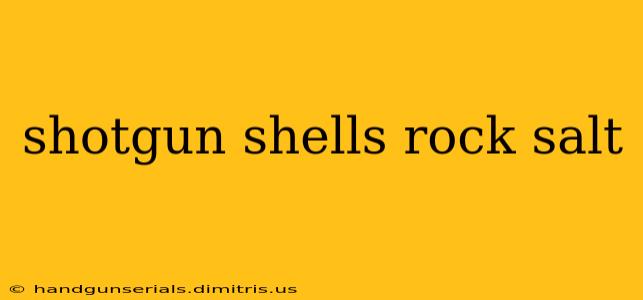Shotgun shells loaded with rock salt are often considered for pest control, particularly for deterring nuisance animals or dealing with potentially dangerous situations. However, it's crucial to understand the legal ramifications, ethical considerations, and practical limitations before employing this method. This article explores the multifaceted nature of using rock salt in shotgun shells, providing a balanced perspective for informed decision-making.
Understanding Rock Salt's Effectiveness
Rock salt, unlike traditional lead or steel shot, is a relatively soft material. Its effectiveness stems from its impact and the potential for minor abrasions. While it can deter or incapacitate animals, its lethality is significantly lower than that of traditional shot. This makes it a seemingly humane option for certain situations. However, its effectiveness is highly dependent on several factors:
- Shot size and distance: Larger rock salt projectiles at closer ranges are more effective. Smaller sizes at longer ranges will likely have minimal impact.
- Animal type and size: Rock salt is generally more suitable for smaller animals. Larger animals may not be significantly affected.
- Target accuracy: Precise shots are necessary to maximize the impact and deter the animal.
Legal and Ethical Considerations
The legality of using rock salt shotgun shells varies significantly depending on location and specific circumstances. Some jurisdictions may outright prohibit it, while others may have restrictions regarding the type of animal, the hunting season, or the proximity to populated areas. Always check your local and state laws before considering this method.
Furthermore, ethical considerations are paramount. While the reduced lethality of rock salt is often touted as a humane approach, the potential for prolonged suffering or inadequate incapacitation necessitates careful consideration. The effectiveness of deterring the animal should be carefully weighed against the potential for causing unnecessary pain or distress.
Practical Limitations and Alternatives
Several practical limitations exist when using rock salt in shotgun shells:
- Pattern density: Rock salt tends to have a wider, less concentrated pattern than traditional shot, making precise targeting more difficult.
- Range limitations: Effective range is significantly shorter compared to conventional ammunition.
- Weapon suitability: Not all shotguns are suitable for firing rock salt, and using inappropriate ammunition can damage the firearm.
- Clean-up: Rock salt is relatively messy and can be challenging to clean up after use.
Alternatives to rock salt should always be explored. These might include:
- Less-lethal options: Pepper spray, air horns, or other non-lethal deterrents may be more effective and humane in many situations.
- Professional help: Contacting wildlife removal professionals is often the best approach for dealing with problematic animals, ensuring both the animal's safety and your own.
Conclusion: A Cautious Approach
Rock salt shotgun shells can be a viable option in specific circumstances for pest control. However, a thorough understanding of its limitations, legal implications, ethical concerns, and availability of alternatives is essential. Always prioritize safety, legality, and humane practices when dealing with nuisance animals. Consulting with wildlife control experts is highly recommended before implementing any pest control measures. Improper use can lead to legal repercussions, ineffective animal control, and potential harm to both animals and humans.

